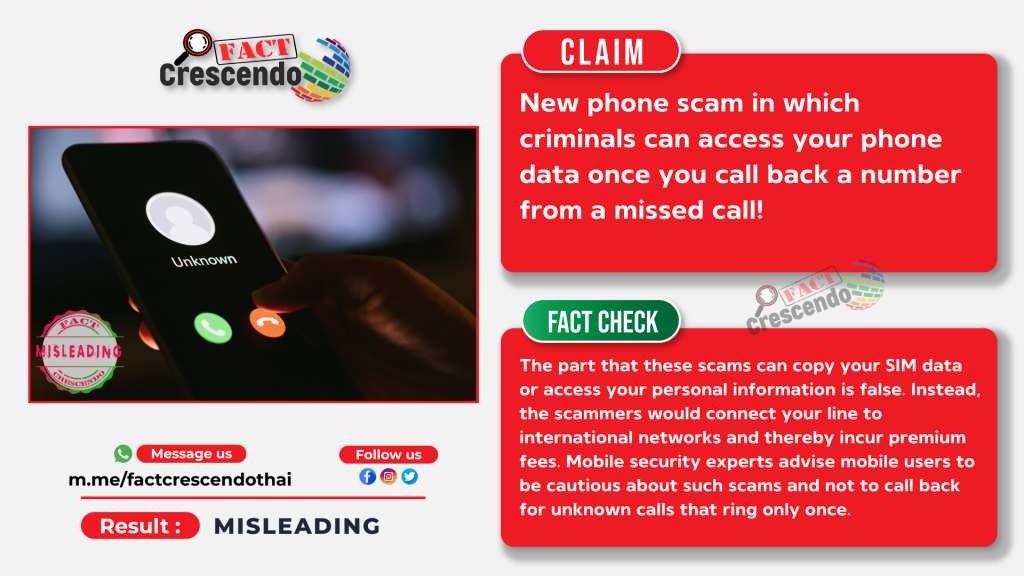
Various scammers and criminals use several tactics to defraud individuals and steal their information. As mobile phones are an integral part of most, these devices often get targeted in such planned attacks, which can be in the form of unsolicited calls, texts, voicemails, etc.
Hence, many advisory messages get circulated informing the public to beware of phone scams and their modes of operation. Unfortunately, while it’s essential to be cautious about the latest scams, some posts are created with fabricated narratives, as we found out with the below viral post.
Social Media Posts
A Facebook post claimed that if you receive calls from certain types of numbers with international codes and ring only once, it indicates an attempt at one ring scam.
The posts say that if you call back any of such numbers, the scammers could copy your contact list within 3 seconds, along with confidential information such as bank credit cards, etc., if they were stored in the phone.
The Facebook posts cite another mobile scam, which gets activated when the victim presses 90 or #09, enabling the scammer to access the SIM card information

Apart from the recent post above, we found that this claim has been circulating on social media circles for years.

Many users thanked the post’s owner for sharing this valuable information. Anyway, is it possible to collect your data through a voice call? Let’s find out the facts.
Fact-Checking
When investigating the first part of the viral message, we came across the term “One-Ring Scam,” a telecommunication fraud targeting mobile phone users globally.
What is One-Ring-Scam?
It involves receiving a missed call from a foreign number; when an unsuspecting recipient calls back the same number, they are charged a premium fee, often in the form of an international call charge or a subscription to a premium service.
Most of the time, these scammers try to increase the call time by connecting the return call without answering and using tactics such as playing a recorded message on some calls.
If a pre-paid mobile service is available, the call could get disconnected due to a lack of balance. On the other hand, if you use a postpaid service, you may unknowingly add many call charges to your bill.
John Tesh’s Facebook Page has explained the “One-Ring Scam” in the below video:
(Source)
Can One-Ring Scam access your SIM card?
However, the One-Ring Scam does not have access to your SIM card. Instead, the scam works by tricking individuals into calling back a foreign number they perceive to be a genuinely missed call. Therefore, even though users ended up being charged a premium fee for the international, this scam does not involve having direct access to the individual’s SIM card or phone.
This can only be done if a third party somehow enters the phone through unauthorized access (via a malicious app or other codes) or if you give some permission for those activities.
Advice from the Experts
The Federal Trade Commission (FTC) and the Federal Communications Commission (FCC) have issued warnings and advice to consumers on protecting themselves from the scam. For example, the FTC recommends being cautious of unknown numbers and not calling back unknown numbers.
In addition, the FCC advises consumers to check their phone bills for unexpected charges and to contact their phone service provider if they suspect they have been scam victims. You can read more about this scam and the steps to avoid it here and here.
Sri Lanka Computer Emergency Response Forum (CERT) Information Security Officer says that according to many reports, these calls mostly come from countries like Burundi, Malawi, Pakistan, Belarus, etc. Some of the codes used in these scams are 268, 809, 876, 284, and 473. It is also said that complaints have been received which had codes belonging to the United States of America and the Caribbean Islands.
We also looked at the second part of the message, which says, “Also, Don’t Press
*90 or #09*On your Mobile when asked by any caller….”
What is 90# Telephone Scam?
Using a keyword search, we found that this corresponds to the famous 90# Telephone Scam and applies to landlines connected via the PABX system and is not relevant to mobile calls, confirmed by AT&T’s assistant vice president for corporate communications as well for Leadstories
The Federal Communication Commission in the US has described how this scam occurs similar to the above “one-ring-scam’ by requesting the users to dial 90# or by transferring the call to an outside line before hanging up. More on this here | Archived
Conclusion
Our investigation found that while the long advisory message is helpful for social media users to be vigilant about phone scams such as one-ring-scam and 90# scam, these scammers operate by connecting your line to international networks and thereby incurring premium fees.
However, the claim that these scams can copy your SIM data or access your personal information is false. By staying informed and taking simple steps to protect yourself, you can avoid becoming a victim of the One-Ring Scam and other similar scams. Mobile security experts advise mobile phone users to be cautious about such scams and not to call back for unknown calls that ring only once.

Title:One-Ring Scam: What Should You Be Worried About & What Not?
Fact Check By: Cielito WangResult: Misleading




